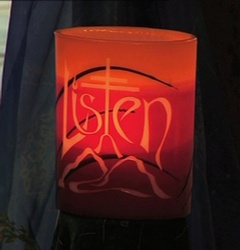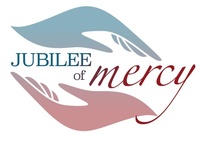Prayer
Jubilee Year of Mercy
February 7, 2016 | Reflections From Sr Mary
“Later that night I held an atlas in my lap ran my fingers across the whole
world
and whispered
where does it hurt?
it answered
everywhere
everywhere
ran my fingers across the whole
world
and whispered
where does it hurt?
it answered
everywhere
everywhere
These words written by the Somali-British writer and poet, Warsan Shire, appeared on various internet sites after the terrorist attacks in Paris last year. It has been quoted again in the description of this year’s Paschal Candle design and it will form the basis for our reflections over the next few weeks as we focus more intensely on the challenges of Jubilee Year of Mercy.
The question, “Where does it hurt?” can apply not just to the atlas, the world, but to each one of us, to our sisters in community, to our community as a whole, to the people who come here to our cottages and our church, to our families…we could go on and on widening the circle until we encompass all of humanity. In fact, if the words of the poem were expanded, we could easily ask, “who hurts?” and the answer would be “everyone, everyone, everyone”.
Before we focus on “everyone” and “everywhere” in this Year of Mercy, however, I think it is important that we begin with ourselves because unless we have a personal understanding and acceptance of God’s love and mercy in our own lives, we will be incapable of sharing that same mercy with others.
Pope Francis suggests that in order to be capable of mercy, we must first of all dispose ourselves to listen to the Word of God. “This means”, he says, “rediscovering the value of silence in order to meditate on the Word that comes to us. In this way, it will be possible to contemplate God’s mercy and adopt it as our lifestyle.”
 So, we are called, first of all to Listen…a very Benedictine quality as we know! To listen, open our ears, our eyes and our hearts to all the ways God’s mercy comes to us.
So, we are called, first of all to Listen…a very Benedictine quality as we know! To listen, open our ears, our eyes and our hearts to all the ways God’s mercy comes to us.
If we but realized the gift of God that is welling up inside us when we break bread and drink wine together! Mercy and grace are that wellspring given in so much abundance that we always have enough to share with others….if we but realized…
Sometimes we have to drill or dig deep into the earth of our hearts to find the water table in order for it to spring up. If we dig deep enough and have the faith and the courage to allow this ocean of Love, this ocean of Mercy to spring up within us it will flood our world and our monastery……..
if we but knew the gift of God…….
So, today and throughout the following week, I would like to  invite us all to be utterly focused on our own relationship with our God, in our prayer, our lectio time, our listening and personal refection. By that I mean that we ponder the beautiful quality of God’s mercy offered to us at every moment of our lives.
invite us all to be utterly focused on our own relationship with our God, in our prayer, our lectio time, our listening and personal refection. By that I mean that we ponder the beautiful quality of God’s mercy offered to us at every moment of our lives.
I also invite each of us to ask ourselves that question “where does it hurt?”. Sometimes in our lives which we live so closely together, we get very used to appearing strong, trying not to show our vulnerability or hurts in front of others. Many of us, if hurt, can show some upset one day but then bounce back the next as if nothing happened. We need to appear in control not showing weakness in any way. This can become so natural to us that we begin to do the same in our prayer. We can forget to be real before God. We can spend our lectio time in our head or we can fill it up reading articles or books or even allow it to be swallowed up with work of some kind or another.
In a life dedicated to prayer, we can so easily go missing from ourselves before God, we can pretend, we can hide our real selves from God. This year invites us, challenges us, implores us to get real! So, let us ask the question: where do I hurt? what pains me? Where do I feel vulnerable, afraid, broken? Where and how do I hide my real self from myself and from God? Where do I need God’s mercy in my life now?
In naming those hurts, let us open them to God thus allowing the balm, the ocean, the fullness of God’s mercy to meet us, anoint us, flow over us, drench us.
If we but knew the gift of God ………
Do we dare contemplate it?
Do we dare seek it?
Do we dare open ourselves totally to receive it?
Do we dare allow it to enter our very being so fully that it will enlarge us, shape us, change us?
May this Jubilee Year be for each one of us a time of deepening awareness of the tenderness and mercy of our God. May it be one of spiritual richness, healing and grace.
Questions for Reflection
How do you define the word mercy?
We can never know the depths of God’s mercy but as with every quality of God, we are given signs, glimpses, experiences to whet our appetite, sometimes amazing us, comforting us, challenging us, surprising us, always deepening our knowledge of God and our relationship with him. What signs of God’s mercy have you heard, seen and/or experienced?
When have you experienced mercy from others in your life? Can you remember specific times when it happened and the effect it had on you?
Have you had moments or times in your life when you have experienced the depths of God’s mercy? Have they been moments of faith and/or moments of feeling a deep sense of healing, forgiveness, and everything else entailed in mercy? Spend some time reflecting on these experiences and the effect they have had on you.
As you reflect on your life now, using the words of the poem, “Where are you hurting?” Note “everything” you can think of including physical hurt, spiritual, emotional, relationships, memories etc
Spend some time today and as often as possible during this “year of grace and mercy”, holding out these hurts to God and praying for the balm of mercy, the ocean of mercy to wash over you.
There are numerous references to God’s mercy in the psalms and canticles we pray each day in the Office. Try to be mindful of these during the coming week and take them as your word for the day or your lectio text.
I would like to invite you to take one of these Journals and use them during the Year of Mercy.
Write down the words you hear during the Liturgy and the words you hear during lectio divina.
They have blank pages inside so you could express your feelings, your experiences in a drawing.
Or you could cut pictures out of a magazine that speak to you.
Or take a photograph resulting from your visio divina walks and stick that into the Journal with a few words explaining what the photograph says to you.
Another thing that you could do is add words from Pope Francis that particularly speak to you during this year.










